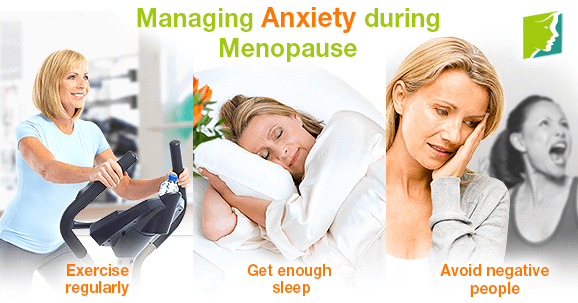Anxiety is a constant feeling of dread or worry, often for no apparent reason. The disorder can manifest itself distinctly in different people, and there are a range of physical and psychological symptoms that can arise. Menopause is a prime time for many women to develop anxiety, and this is for a number of reasons - hormonal imbalances is the principal one.
Although anxiety can feel like an inevitable part of menopause, it does not have to be. Managing anxiety during menopause is possible. Read on to discover the best tips for managing anxiety.
Exercise Regularly
Regular exercise is one of the most effective ways of managing anxiety because it encourages the release of the natural "happiness" neurotransmitters, serotonin, and endorphins. For an average adult, at least 150 minutes of exercise every week (three times a week) is normally recommended for overall health, and is also known to keep blood sugar and hormone levels. A quick burst of physical activity when you are feeling down should work as an effective short-term measure, but also keeping up a consistent exercise regime should reduce the instances of anxiety episodes in the future.
Get Enough Sleep
Lack of sleep is a leading cause of irritability and irrational thoughts, and this will only serve to worsen anxious feelings. The trouble with dealing with this symptom is that the negative thought processes that are a direct result of anxiety are often the reason for insomnia in the first place. However, one of the main tools in managing anxiety is to sleep well, allowing you to feel refreshed during the day. Some ways to promote good sleep are keeping your bedroom cool, dark, and quiet.
Don't Spend too Much Time Around Negative People
Human beings are hard-wired to pick up on the emotional cues of others, so spending too much time with highly negative or anxious people will have a direct effect on your own mood and provide justification for negative feelings. Ensuring you surround yourself with people who have an optimistic outlook is a good way of managing anxiety, as it will reduce your own destructive thoughts and help you see things in a more positive way.
Anxiety is a constant feeling of dread or worry, often for no apparent reason, and menopausal anxiety is a problem that many women struggle with, and it can have a negative impact on work and social life. It is easy to fall into a vicious cycle of negativity and see no way out, but working on a few self-help remedies should give you a hand in beginning to gradually reduce the anxious feelings. Likewise, Regular exercise is one of the most effective ways of managing anxiety.
Sources
- National Health Service. (2014).Winter out winter tiredness.. Retrieved September 29, 2014, from http://www.adaa.org/about-adaa/press-room/facts-statistics
- Anxiety and Depression Association of America. (2014). Symptoms. Retrieved September 29, 2014, from http://www.adaa.org/understanding-anxiety/panic-disorder-agoraphobia/symptoms
- Love, S. & Lindsey, K. (2003). Dr. Susan Love's Menopause & Hormone Book. New York: Three Rivers Press.
- National Institutes of Health. (2014). Anxiety. Retrieved September 29, 2014, from http://www.nlm.nih.gov/medlineplus/anxiety.html
- National Institute of Mental Health. (n.d). What is Anxiety Disorder? Retrieved September 29, 2014, from http://www.nimh.nih.gov/health/topics/anxiety-disorders/index.shtml




